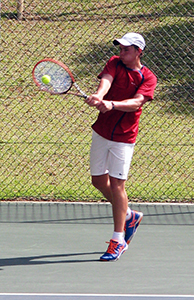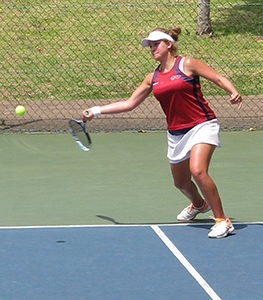
Ruben Kruger of the University of the Free State in action at the 2015 USSA tournament in Cape Town.
Photo: Janine de Kock
|
A winning culture in the Kovsies Tennis Team, combined with good planning, contributed to the University of the Free State (UFS) USSA success recipe.
This is what Janine Erasmus, one of the team's captains, had to say.
According to her, this is why the UFS were able to handle the pressure of being the favourite so well, and this is what helped her team to achieve a ninth consecutive gold medal in Cape Town on 4 December 2015.
This was the sixth year in a row that the UFS triumphed in the combined USSA format since its inception in 2010. In 2007 and 2008, its Women's team won gold, and in 2009, it was the Men's team.
Erasmus was full of praise for the Kovsie coach, Marnus Kleinhans, and Janine de Kock, manager of KovsieTennis.
“We had a build-up of a few months to the USSA tournament, and they (Kleinhans and De Kock) already knew exactly what to do,” she said.
Erasmus, who won a third gold medal, believes her team had great depth this year.
Four in select squad
Kovsies and Maties played in the USSA Tennis Finals for a fourth consecutive year.
Erasmus and her team beat the Stellenbosch team 7 - 3 on 4 December 2015, after they defeated Tukkies 8 - 0 in their semi-final.
 Mareli Bojé is one of four tennis players of the University of the Free State included in a 2015 USSA tournament team.
Photo: Janine de Kock
|
Arné Nel, Cornelius Rall, Duke Munro, and Mareli Bojé are the four Kovsies included in the USSA tournament team.
Nel, the other captain from the UFS, won all his matches for the third successive year. Munro won a gold medal at USSA for the seventh year in a row.
Gold for Table Tennis
Three UFS sports teams made it to the USSA finals, all against Maties. The tennis and men's table tennis teams were both winners, but the Sevens rugby team got stuck.
The Kovsie table tennis team beat Maties 3 - 1 in Kimberley.
Silver for Sevens rugby
The Kovsie Sevens rugby team, third at USSA for the past two years, walked away with silver in George on 1 December 2015.
The team was defeated by Maties 10 - 31 in the final. This was after they won 24 - 14 against Pukke in the semi-final, and 28 - 12 against the Central University of Technology in the quarter final.
Tukkies, the 2014 USSA Sevens champions, together with several other teams, did not take part because the tournament was postponed because of the nationwide student protests.
The Kovsie swimming team took part in the USSA tournament in Johannesburg from 28 November to 30 November 2015.